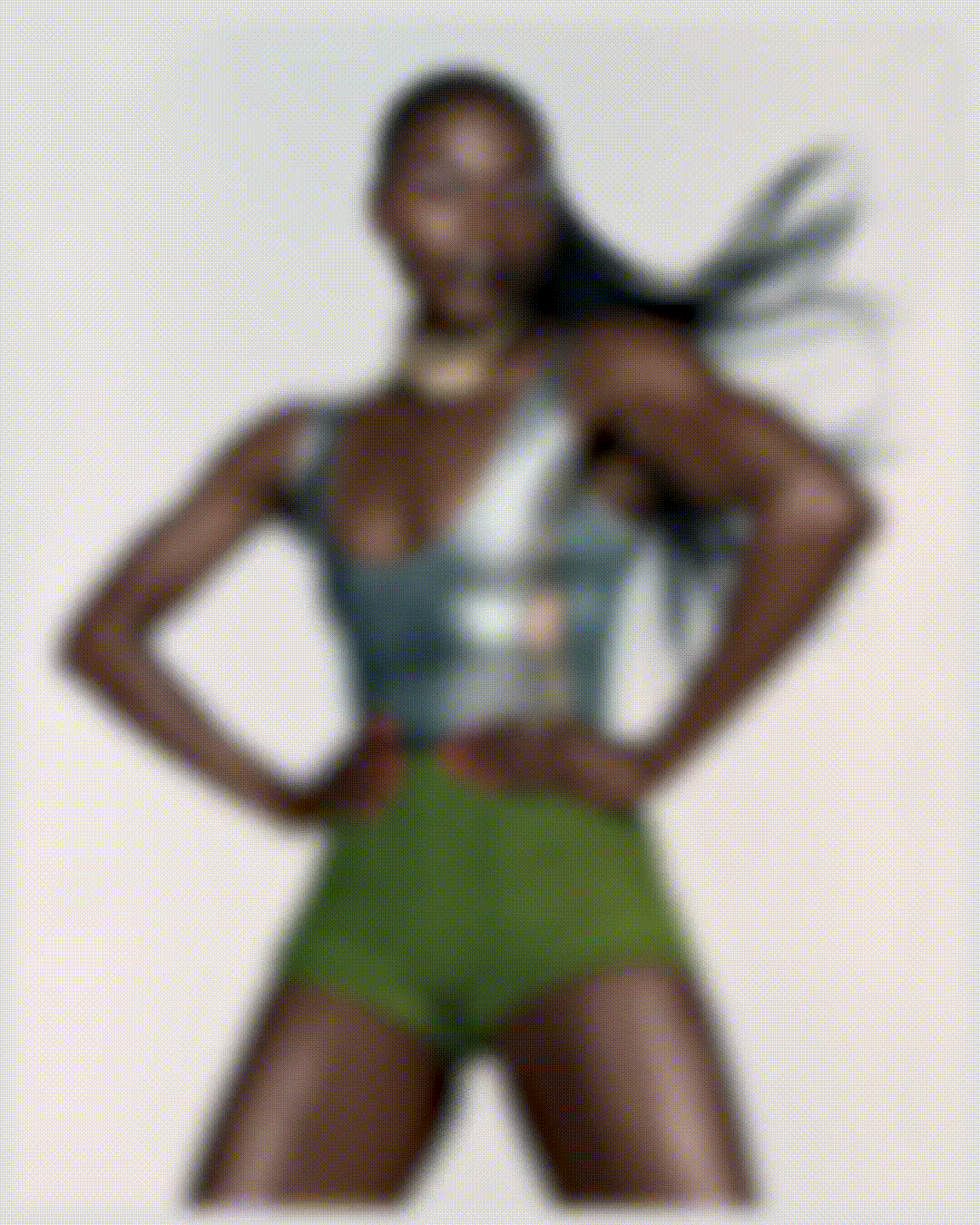Precisely six hours before the starting gun goes on race day, Dina Asher-Smith can be found sitting in front of a mirror, wearing a Himalayan Charcoal Purifying Glow Mask from The Body Shop. With a latte to hand and RuPaul’s Drag Race playing in the background, Britain’s fastest woman will apply various creams and serums, then a department-store beauty floor’s worth of make-up. (At least half will be sweated off during her warmup, so she over-applies to achieve optimal results.)
The “getting ready” process, executed quietly and methodically, takes exactly an hour. Asher-Smith explains, “When I’m out on the track, I’m not thinking about what I look like. I’m just trying to win. But beforehand, I need to be calm. Doesn’t matter how nervous you might feel, if you need to do your eyeliner, you cannot be shaking.”
Dina has always loved make-up. The bathroom in her flat in Orpington, on the outskirts of south-east London, where she lives alone, is chock-full with products. Friends who go on holiday with her know to leave ample time to get through check-in – Dina’s bags will inevitably be overweight. She keeps Pat McGrath face powder in her bag with her Nike spikes, as well as a tube of Bobbi Brown lip gloss, which she’ll apply at the very last moment before the race, because it’s a bit sticky. Nothing is left to chance. Dina wants to look fantastic. If she wins – when she wins – she’ll be on the six o’clock news, her face plastered on the front of the newspapers.
But the reigning 200m world champion also needs distraction. “The thing John and I talk about most on race day is my eyeshadow and how I created the combination of colours. He pretends to care,” she says, laughing. John is John Blackie, the gentle-mannered Essex-born veteran coach under whom she has trained since she was an eight-year-old pipsqueak, coerced into attending her first running session with the promise of a screwball ice-cream. Race days for Dina can be anything from Diamond League one-day events to indoor championships. This year, she will be one of Britain’s best hopes for Olympic medals in the 100m, 200m and 4x 100m relay in Tokyo. She needs to focus. “Before a race, John’s just like, ‘Chill out, you’ve done the work, go and put on a show. It’s a performance.’” Dina likes to channel Beyoncé: she listens to “Lift Off ” before a race.
The 25-year-old is telling me this in characteristically animated fashion over an untouched cream tea (she’s on a strict diet, although she sneaks a scone) in the garden of a hotel in Bromley, after an intense training session. It’s the first day of a new phase of lockdown relaxation in England, and Asher-Smith, like any other twentysomething who has been cooped up at home for more than a year, is excited to be out. “I got like, 10 WhatsApps inviting me places today!” she says, shrugging off her Nike Nocta puffer and setting down a black Telfar bag. Unlike most other twentysomethings, however, the release comes with added significance: it means the sprinter is one step closer to achieving her Olympic dream come the end of July.
For an elite athlete, delayed gratification – and the coping mechanisms of self-discipline and sheer hard work – is second nature. So perhaps it shouldn’t come as a surprise that her initial reaction when she read on Twitter in March last year that the 2020 Games had been postponed was relief. “I’d gone from being naive and dismissive [of postponement rumours] to training from my living room,” she recalls of those early days of lockdown. “And I just remember thinking, ‘This is mad. I can’t run, I can’t sprint. You’re telling me I’ve got to be in the shape of my life – from my flat?’” When the news broke, she bought a chocolate cake and a six-pack of Coca-Cola and wallowed on the sofa for two weeks watching Tiger King. Then she got a nudge from John: time to start training again.
The disruption may have played to her advantage: Asher-Smith has used the past year to repattern how she runs. With a busy few years coming up – the Olympics this summer will be followed by an unprecedented treble in summer 2022, with the World, Commonwealth and European championships squeezed into a window of less than six weeks – she also began sessions with a sports psychologist. “Sometimes it’s great to take a step back, rewire your body, check the way you move, fix any small imbalances, and make sure I’m as technically efficient and robust as possible,” she says.
Lockdown also gave her the chance to take some time out from the increasing media scrutiny that comes with being a gold-medal sprinter. “If I’m completely honest, I was very happy that we had the lockdown,” she says, looking sheepish. “Obviously nobody wanted a pandemic. But a quiet time where I could almost vanish – that was great. I really needed it.” Although she is excellent company (zero other interviewees have ever brought me a spare coat, just in case I get cold, nor texted to make sure I got home safely) and comes across as entirely self-assured, talking nineteen to the dozen and laughing frequently, most often at her own expense, she admits that adjusting to her growing fame has been “strange”.
“I’ve definitely had to learn to come out of my shell. To go through that personal journey from being shy to suddenly – boom! You’ve got to be ‘on’ all the time.” She describes fan interactions as overwhelmingly positive, but says no one can prepare for their name being mentioned in Parliament, as hers was in 2019, when first Diane Abbott and then Nicky Morgan called on the whole House to congratulate her. “I pride myself on being very normal,” she says. “I love floating under the radar. I pop out, run, then spend the rest of my time with my friends. But when I came home from the World Championships…” She chuckles at the memory of her 2019 triumph, where she made history as the first Briton to win three medals at a major global athletics championships. “Suddenly people are diverting their train routes to get on my carriage and say well done. I don’t want to get upset because it’s dealable, but it’s just… insane.”
Geraldina Asher-Smith was born in Orpington in 1995, the daughter of Julie, a human resources director whose Twitter bio reads, “Known to shout trackside, very loudly”, and Winston, a mechanical engineer. She was an energetic child: at the age of eight, she was doing Brownies and French lessons, swimming twice a week, playing the euphonium and the tuba, and platform diving on Sundays. Around the same time, she was dragged to a running session, then to a Bromley Primary Schools Cross Country Association race, where her mum promised her a Bratz game for her Nintendo GameCube if she finished. She surprised herself by coming fifth. By 13, she had decided to dedicate herself to sprinting. “I’m very impatient,” she says, “so it made sense that I would fall in love with sprinting. You’ve got one chance. You mess it up, it’s done. It’s high stakes, but I love that. It’s so much fun.”
“She was in a group of hundreds of young people,” John recalls. “But you could see straight away she had talent.” Sprinting didn’t eclipse schoolwork: at Newstead Wood School, she got nine A*s and a distinction at GCSE level, then sailed through her A levels, winning a place to read history at King’s College London. If she hadn’t ended up in elite sport, her plan was to become a barrister. In her final year at King’s, as she grappled with rehab after surgery on a fractured foot just five months before the World Championships at London 2017, she managed to produce a dissertation analysing the commercial images of jazz titans Louis Armstrong and Duke Ellington, revise for her finals and ultimately graduate with a 2.1. Even more impressively, after having been told she could be out for two years, she ran a season’s best to qualify for the 200m final at the Championships, missing out on a medal by seven-hundredths of a second.
The result astounded even her. “When I fractured my navicular, I remember thinking, ‘Shit. F**k.’ Excuse my language! I lay in bed for two weeks crying,” she recalls. “Then I had to start my dissertation. I wouldn’t wish that on anyone.” She still rues that tantalisingly close fourth position. “It probably wasn’t my most ‘successful’ track year, but for my own confidence, self-belief, who I am – Dina the person – it was the most pivotal year of my life. I look back and think, ‘I was crazy!’”
It seems almost inevitable that Asher-Smith has dedicated herself to raising the profile of women in sport. She’s modelled for Valentino and Off-White, and been turned into a Barbie doll. In March, she won an International Sports Press Association award for her Telegraph column, having written a particularly eloquent piece in the aftermath of the murder of George Floyd. Today, she touches on the racism her grandmother, Sislyn, a nurse who came to Britain from Trinidad in the 1950s to work for the NHS as part of the Windrush generation, and her parents have faced in this country. “My parents were very good at shielding me from things,” she says carefully. “It made me feel grateful for where I am now. Is life perfect? No. But the most challenging thing in my life is to run in a straight line.”
She talks enthusiastically about getting young women involved in sport. “We need to see sportswomen and role models on a larger stage. We have to show it can be a career path,” she says. And not just a career path that ends on a podium. “Girls need to see female athletes sweating, getting frustrated, throwing their shoes on the floor because they’re annoyed – they can’t just see them holding a bouquet of flowers, or smiling and being polite.” We return to the subject of make-up. “I don’t want to be offensive… but the pervading stereotype of sportswomen wasn’t something that necessarily resonated with me at age 13.” How would she describe that stereotype? “Miss Trunchbull from Matilda,” she ventures. “I loved make-up, dressing up. I wanna feel like a princess! I always do. Sport should be about being the best version of yourself, having confidence in who you are, what you stand for, what you can do”
Right on cue, a fellow diner approaches our table. “I thought it was the patio heater, but I can feel the greatness radiating off you,” he says, as Dina bursts out laughing. “I have two daughters, and I am so proud that you exist. I know that you’re doing this work for so many. And it’s working,” he says. The athlete is all smiles: “You’ve made me so happy,” adding that she’ll do her best to win. As he walks away after extracting a selfie, she says, “I don’t think you ever get used to stuff like that. It’s lovely.” Then she snaps into focus. “When I started, I didn’t imagine that I would be one of the best in the world – absolutely not. Are you crazy? That’s absolutely insane. I’ve always just wanted to improve on my best.”
She hasn’t let herself contemplate winning in Tokyo. “If I want to be successful, I can’t get carried away,” she insists. “Sprinting is very clinical. It’s a paradox: you have to be as powerful and aggressive as possible, but at the same time super-relaxed and graceful. I’ve always wanted to be an Olympian. But I also understood how difficult that is. I love it, but if it doesn’t happen, it’s gonna be all right.”


